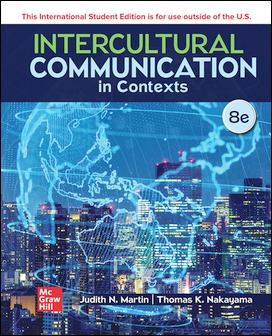書籍分類

(E-Book) Intercultural Communication in Contexts 8/e
作者:Judith N. Martin, Thomas K. Nakayama
原價:NT$ 1,000
ISBN:9781264364060
版次:8
年份:2022
出版商:McGraw-Hill
頁數/規格:電子書
參考網頁:Intercultural Communication in Contexts 8/e
版次:8
年份:2022
出版商:McGraw-Hill
頁數/規格:電子書
參考網頁:Intercultural Communication in Contexts 8/e
內容介紹 目錄 作者介紹
- 電子書訂購前請先詳讀:
- 訂購付款完畢後,請填寫 電子書回報資料-官網訂單,資料若不全,將影響您後續派送權益
- 查看 電子書平台登錄與註冊說明
- 查看 電子書平台操作手冊
- 此訂單為電子書,非紙本課本,電子書兌換碼一旦派送,則無法辦理退貨。
- 若有任何問題請 Email 至 ebook@tunghua.com.tw
帳號訂購流程
Step 1 登入會員 非東華網站會員,請點選右上角『註冊』。
Step 2 點選 『加入購買』填寫相關資料,並確認訂單無誤後,即可送出訂單。
Step 3 審核訂單 訂購單會盡力於24小時內(遇周末假日順延)審核,確定有庫存,系統會發送『付款通知信』至指定信箱。
Step 4 付款 收到付款通知信後,請於七天內付款。
Step 5 電子書兌換碼 確認入帳後,約 1-3 個工作天派送電子書兌換碼,會發訊息至您的個人 email 信箱。
Description
Intercultural Communication in Contexts examines communication in multicultural relationships and provides the tools for effective communication amid cultural, ethnic, and religious differences in domestic and global contexts. Students are introduced to the primary approaches for studying intercultural communication along with a theoretical and practical framework for applying the approaches in their own lives.







